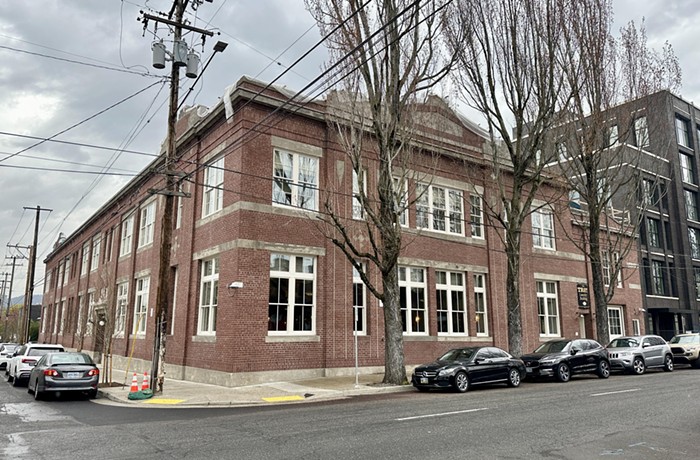In 1945, freeway mogul Robert Moses recommended the city of New York tear out old Bronx neighborhoods to build the massive community-wrecking Cross Bronx Expressway.
But in 1943, the powerful man came to Portland and holed up for two months with his urban planning team in the hotel downtown that is now the Embassy Suites. They wrote up an 86-page plan (plus fold-out diagrams) for the city titled "Portland Improvement," which I am now holding in my hands thanks to local blogger and amateur historian Dan Haneckow.
While a lot of Moses' plan for the shape of future Portland is terrifying for modern progressive transit advocates—he envisioned two rings of freeways encircling the city—his long-winded introduction to the report rings surprisingly relevant today (in these dark times etc etc):
Every citizen of Portland has a right to be proud of the fact that this community is prepared, while there is still time, to face the future with unclouded vision and with a determination to meet the challenge, whatever it may prove to be. The community which meets the problem early, squarely, and with no ducking, dodging and buck-passing and, on the other hand, none of the false pride which scorns state and federal aid, will somehow find the answer.

- via Cafe Unknown
- Moses Wanted $2 Million in "Improvements" to Harbor Drive, Bringing this Postcard-Perfect Vision of our former Waterfront up to Date.
He hits the nail on the head when discussing long-term controversy over urban growth:
There are still honest, conservative, by no means reactionary leaders in the community who are not anxious that it shall grow rapidly or become a great metropolis... It is impossible not to sympathize with those who with that Portland shall keep as long as possible the flavor of a transplanted New England. There are others in Portland who believe that the future of the entire region is so promising that not only all war workers but many more outsiders can and should be invited into the community to make and share the prosperity which is already on the horizon.
Okay, so the "prosperity on the horizon" is looking pretty grim these days, actually, but those outsiders are the majority in Oregon now, with Beaver State natives making up only 44 percent on the population (a factoid learned in our last Brewhaha).
The kicker is that Moses raised the hot issue of the current Vancouver mayor's race: tolling on the proposed I-5 bridge before the I-5 even existed and 60 years before the massive Columbia River Crossing project starting rolling!
A toll could not be imposed on the new bridge unless a similar toll were imposed a the existing crossing, and the two bridges would have to operate together under an interstate agreement... Assuming that traffic over both bridges would not call below 6,000,000 a ten cent toll for passenger cars and a graduated toll for trucks and buses would support a self-liquidating structure if there were a federal subsidy of 30 percent. There are, however, complications in dealing with people in two states, restoring tolls where they have been eliminated, and other questions of local approval as to which we have little judgment.
So that officially makes Robert Moses more forward-thinking than the current anti-toll forerunner in the Vancouver mayoral election.


















